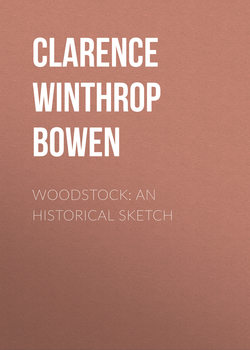Читать книгу Woodstock: An historical sketch - Clarence Winthrop Bowen - Страница 5
IV
ОглавлениеThe time had now arrived for the white man to make a settlement at Wabbaquasset. In May, of 1681, the General Court of Massachusetts Bay had given to William Stoughton and Joseph Dudley the care of the Nipmuck country, with power to ascertain the titles belonging to the Indians and others, and a meeting of the claimants was held the following month at Cambridge, at which John Eliot rendered much assistance as interpreter. Dudley and Stoughton purchased all the claims, and the following year,24 the whole Nipmuck country became the property of Massachusetts Bay. Jurisdiction over the country had already been claimed, under the terms of the Massachusetts charter. Many of the inhabitants of the town of Roxbury now felt that they could improve their condition and increase their usefulness by forming a settlement in some desirable portion of the new country. Undoubtedly their pastor, John Eliot, had told them of the beauty and fertility of the country about the Praying Villages of Maanexit, Quinnatisset, and Wabbaquasset.25 Town meetings to arrange for a new settlement, were held in Roxbury in October of 1683.26 A petition was signed, by a number of representative citizens of the town, asking that the General Court might grant to them a tract seven miles square about Quinnatisset, in the Nipmuck country. All save six of the thirty-six who signed this petition, afterwards became settlers of the new town, and of the five selectmen of Roxbury who presented the petition to the General Court, three27 represented families prominent in the early history of Woodstock. The General Court at once granted28 the petition provided the grant should not fall within a section to be reserved for Messrs Stoughton and Dudley, and Major Thompson, and provided also that thirty families should be settled on the plantation within three years from the following June, “and mainteyne amongst them an able, orthodox, godly minister.”29 In 1684 Roxbury accepted the terms of the General Court, and sent Samuel and John Ruggles, John Curtis, and Edward Morris, as a committee of four, to “view the wilderness and find a convenient place.”
As Quinnatisset had been in part already granted, the committee reported30 a territory “commodiose” for settlement at “Seneksuk and Wapagusset and the lands ajasiant.” A committee was therefore appointed to draw up an agreement for the “goers,” as they were called, to sign. In 1685,31 in answer to the petition of Edward Morris, deputy in behalf of the town of Roxbury, the General Court extended the limit of the time of settlement from June 10, 1687, to Jan. 31, 1688, and granted freedom from rates up to that time.32 At town meetings held in Roxbury, during the same year, it was arranged that one half of the grant should belong to the new settlers and one hundred pounds in money be given to them in instalments of twenty pounds a year, and the other half of the grant should belong to “the stayers” in consideration of the aid given “the goers.” The southern half of the grant was the portion subsequently occupied by “the goers.” Actual possession, however, was not taken until April of the following year. On the second page of the cover of the old and musty first volume of records of the proprietors of New Roxbury, afterwards called Woodstock, are these words:
24
Feb. 10, 1682.
25
Ellis’ “History of Roxbury Town”: “When the people of Roxbury came to take up lands, they selected their locations amongst the praying Indians or where Indians had been converted to Christianity… This certainly is a sure indication of the steady adherence of his [John Eliot’s] fellow-townsmen and their belief in the actual benefits of his missionary labors.”
26
Oct. 6, 10, and 17.
27
Joseph Griggs, John Ruggles, and Edward Morris.
28
Dec. 5, 1683.
29
“Records of the Governor and Company of Massachusetts Bay in New England,” vol. v., 426.
30
Oct. 27, 1684.
31
Jan. 28th.
32
“Records of the Governor and Company of the Massachusetts Bay in New England,” vol. v., 468.
